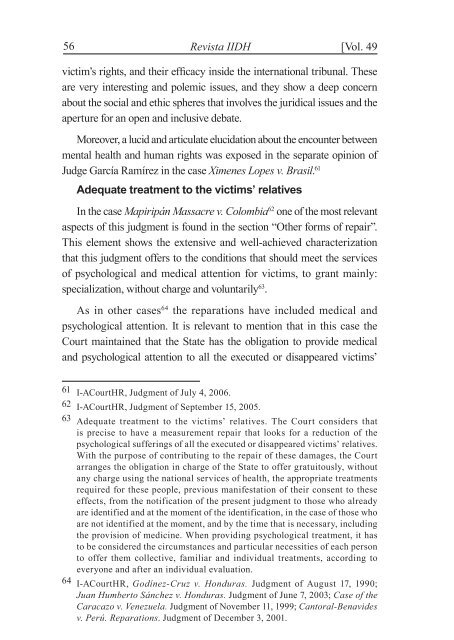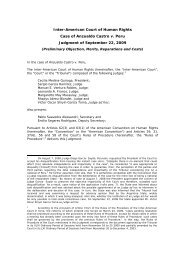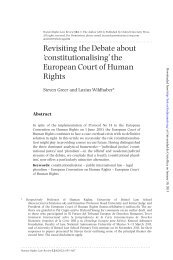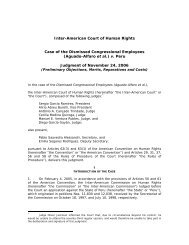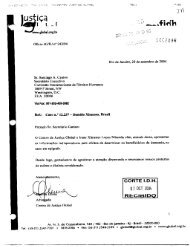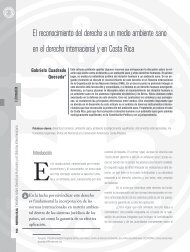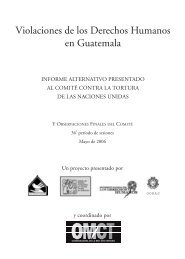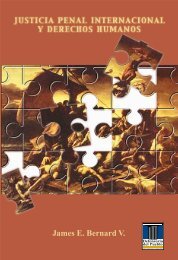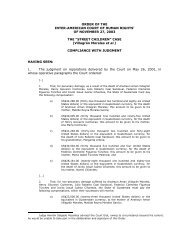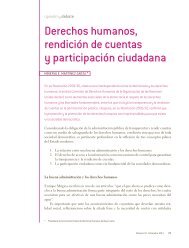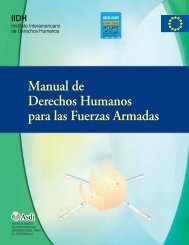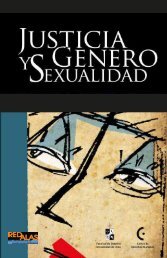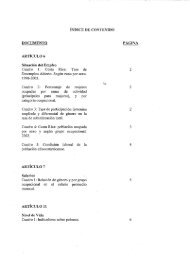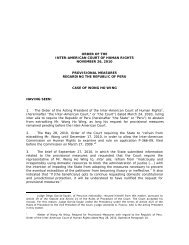Inter-American Court of Human Rights' reparation judgments ...
Inter-American Court of Human Rights' reparation judgments ...
Inter-American Court of Human Rights' reparation judgments ...
- No tags were found...
You also want an ePaper? Increase the reach of your titles
YUMPU automatically turns print PDFs into web optimized ePapers that Google loves.
56 Revista IIDH[Vol. 49victim’s rights, and their efficacy inside the international tribunal. Theseare very interesting and polemic issues, and they show a deep concernabout the social and ethic spheres that involves the juridical issues and theaperture for an open and inclusive debate.Moreover, a lucid and articulate elucidation about the encounter betweenmental health and human rights was exposed in the separate opinion <strong>of</strong>Judge García Ramírez in the case Ximenes Lopes v. Brasil. 61Adequate treatment to the victims’ relativesIn the case Mapiripán Massacre v. Colombia 62 one <strong>of</strong> the most relevantaspects <strong>of</strong> this judgment is found in the section “Other forms <strong>of</strong> repair”.This element shows the extensive and well-achieved characterizationthat this judgment <strong>of</strong>fers to the conditions that should meet the services<strong>of</strong> psychological and medical attention for victims, to grant mainly:specialization, without charge and voluntarily 63 .As in other cases 64 the <strong>reparation</strong>s have included medical andpsychological attention. It is relevant to mention that in this case the<strong>Court</strong> maintained that the State has the obligation to provide medicaland psychological attention to all the executed or disappeared victims’61 I-A<strong>Court</strong>HR, Judgment <strong>of</strong> July 4, 2006.62 I-A<strong>Court</strong>HR, Judgment <strong>of</strong> September 15, 2005.63 Adequate treatment to the victims’ relatives. The <strong>Court</strong> considers thatis precise to have a measurement repair that looks for a reduction <strong>of</strong> thepsychological sufferings <strong>of</strong> all the executed or disappeared victims’ relatives.With the purpose <strong>of</strong> contributing to the repair <strong>of</strong> these damages, the <strong>Court</strong>arranges the obligation in charge <strong>of</strong> the State to <strong>of</strong>fer gratuitously, withoutany charge using the national services <strong>of</strong> health, the appropriate treatmentsrequired for these people, previous manifestation <strong>of</strong> their consent to theseeffects, from the notification <strong>of</strong> the present judgment to those who alreadyare identified and at the moment <strong>of</strong> the identification, in the case <strong>of</strong> those whoare not identified at the moment, and by the time that is necessary, includingthe provision <strong>of</strong> medicine. When providing psychological treatment, it hasto be considered the circumstances and particular necessities <strong>of</strong> each personto <strong>of</strong>fer them collective, familiar and individual treatments, according toeveryone and after an individual evaluation.64 I-A<strong>Court</strong>HR, Godínez-Cruz v. Honduras. Judgment <strong>of</strong> August 17, 1990;Juan Humberto Sánchez v. Honduras. Judgment <strong>of</strong> June 7, 2003; Case <strong>of</strong> theCaracazo v. Venezuela. Judgment <strong>of</strong> November 11, 1999; Cantoral-Benavidesv. Perú. Reparations. Judgment <strong>of</strong> December 3, 2001.


